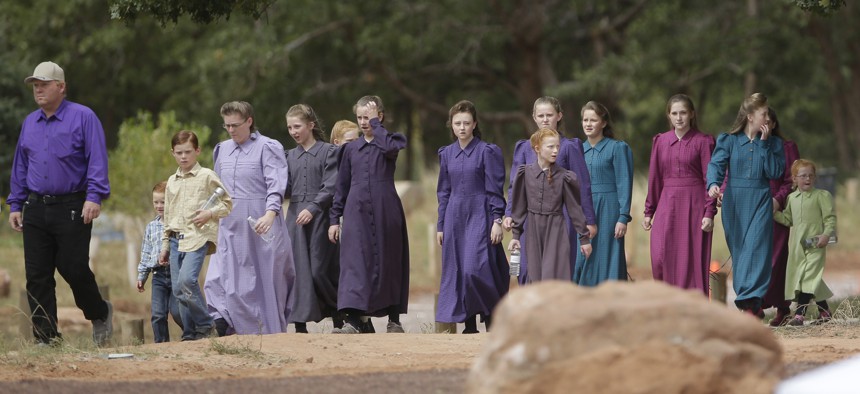Utah Would Decriminalize Polygamy Under Bill Moving Through Legislature

Fundamentalist Mormons in Hildale, Utah, part of the community formerly run by Warren Jeffs. AP Photo/Rick Bowmer
A state lawmaker said that branding polygamists as felons has driven abuse into the shadows.
Polygamy has been a felony in Utah since 1935. But even still, there are an estimated 30,000 people in the state living in polygamous communities—enclaves that critics say are rife with abuse and fraud.
Now a state lawmaker says the isolation of polygamists and their families should move the legislature to downgrade the offense from a felony to an infraction—the legal equivalent of a traffic ticket.
The legislation, sponsored by Republican state Sen. Deidre Henderson, would change the law to make those found guilty of bigamy—defined as a married person marrying again—face a maximum punishment of a fine up to $750 and community service. (Polygamy is the term for the religious practice of taking multiple spouses, while bigamy is the criminal offense for taking an additional spouse while still legally married to another person.)
As the law currently stands, a bigamy conviction carries a prison sentence up to five years, with an additional 15 years possible if there are concurrent charges of fraud, abuse, or trafficking. The proposal would maintain a felony statute for coercing somebody into a bigamous marriage, as well as increasing penalities if there are other crimes, like sexual abuse, committed in the relationship.
The bill was unanimously approved by a Senate committee this week, and now moves to the full chamber for a vote.
Henderson did not respond to a request for comment, but in an op-ed published in the Salt Lake Tribune, the state senator explained that she is “not seeking to legalize polygamy or provide for multiple marriage licenses,” but rather make it so that “plural families feel more comfortable sending their children to school, taking them to the doctor or approaching law enforcement.”
“Branding all polygamists as felons obstructs integration into society and limits access to education, healthcare, and justice; it also allows abuse to escalate unchecked,” she wrote. “The history of raids and family separations, combined with the blanket ban on an entire lifestyle, leads to the fear that an investigation might break up an entire family, removing the children and incarcerating the parents. That’s a high hurdle, and so abuse is kept quiet.”
Henderson said Utah has “enabled abuse” by pointing to the case of Warren Jeffs, a strict fundamentalist Mormon who ran a polygamous community in Utah before he was arrested and convicted in 2011 for sexually assaulting two underage girls who he claimed were his “spiritual wives.” He is currently serving a life sentence.
Former members of Jeffs’ community said they were regularly abused but afraid to come forward.
The Church of Jesus Christ of Latter-day Saints officially forbid polygamy in 1890 following pressure from the government, but the practice continued unofficially for decades afterwards. A representative from the church said that they have not taken a position on Henderson’s bill.
Today, the church excommunicates polygamists, but there are splintered ideological sects that identify as fundamentalist Mormons. They cite Section 132 of the LDS Doctrine and Covenants, which lays out the principle of “plural marriage,” or polygamy, as a way to become closer to God.
Some former polygamists say it does the opposite. Sound Choices Coalition, a Utah nonprofit made up mainly of former residents of polygamist communities who oppose the practice, said it can lead to child marriage, incest, sex trafficking and human rights violations.
"Offenders use [LDS Covenants] Section 132 to justify crimes and deviant behaviors; to subvert and oppress their wives and their numerous offspring who have been indoctrinated from birth into believing that a loving God commanded such suffering and disparity," a statement from the group reads.
The group has condemned the bill in the Senate, and its director, Angela Kelly, spoke out against it during a public comment session. "To make this an infraction? You're essentially saying this is an OK lifestyle," Kelly said.
Kelly last year mobilized support for a law that added bigamy to the list of crimes for which a victim can be awarded reparations.
Henderson’s bill has received a mixed reaction in the fundamentalist community. The Principal Voices Coalition, an advocacy group for polygamous communities, said in a statement that they appreciate the measure. "The criminalization and isolation of a religious minority have harmed families,” the group said. “While all crimes should be prosecuted, we look for the day when whom we love is no longer a matter for law enforcement.”
Other polygamous groups, like the Davis County Cooperative Society, said they do not want to see polygamy prosecuted at all. "However positive the original intent of the bill, it … further cements in the minds of plural families that they are second-class citizens and they will not receive the the same treatment as their neighbors because of who they are, not because of what they do," a statement from the group reads.
Henderson contends that her bill merely “codifies” what the Utah Attorney General’s Office already does—prosecute polygamists for ancillary crimes like fraud and abuse, but not polygamy itself.
Utah’s bigamy law was challenged in 2013 by Kody Brown, a polygamist with four wives who stars in the TLC series, “Sister Wives.” Brown and his wives won in district court, but when the state appealed to the 10th U.S. Circuit Court of Appeals, the case was dismissed. The appeals court ruled that Brown did not credibly face future prosecution under the bigamy law because local county attorneys had a policy much like Henderson described—they would not prosecute polygamy unless other crimes were also revealed.
Emma Coleman is the assistant editor for Route Fifty.
NEXT STORY: Teachers Unions Urge End of Active-Shooter Drills that Can Traumatize Students






